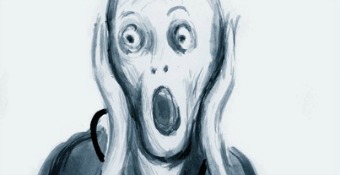Is this neurosis just me or is it part of the job?

Got a moment to spare? Well, obviously not. But if you’d be good enough to create one, I’d like to usher you into my own personal world of seething neurosis/psychosis. And then you can let me know if I really am going mad.
Consider this brief excerpt from a letter from a cardiologist: ‘I think we should increase this man’s enalapril from 5mg to 10mg’. What could be simpler? Well, quite a lot, otherwise I wouldn’t be a writhing, frothing mass of anxiety, would I?
This is just one communication among a massive, complex matrix of interactions
Here’s what immediately enters my mind. Has the consultant told the patient about this change or is he leaving it to me? So am I supposed to be proactive, or will the patient be making an appointment? And if the medication change has already been made, what has the consultant done, exactly? Did he prescribe the 10mg version, or did he tell him to double up his 5mg tablets? So should I change his repeat template? And if so, should that be to the 10mg strength? If I do and he’s actually taking 5mg x2, might he inadvertently start taking 10mg x2 and so overdose? But if I don’t and he isn’t, might he assume I will and so inadvertently continue the 5mg version thereby suffering an underdose? And if I guess and get it wrong one way or the other, will the patient notice and kindly let me know or complain that I’m incompetent/dangerous? And if the latter, will I feel the full force of CQC/GMC/litigation et al and find my career in tatters? So should I get myself on hold on the new Practitioner Health Programme helpline right now, before the queue is longer than my life expectancy?
And so on, until I’m literally convulsing with catastrophic possibilities. That’s before I even get onto the issue of checking his renal function which, frankly, is likely to send me into status anxietus.
Of course, this is just one communication among a massive, complex matrix of interactions we confront every single working day. You might point out that, given the relatively small numbers of errors that are made in primary care, the existing checks and balances must be working well. Which means I’m guilty of some serious overthinking.
To which I would respond by asking, is it the very fact that I have this borderline bonkers level of checking and catastrophising that actually prevents mistakes in the first place? Do we need a certain level of OCD to function properly in general practice? Or does the job inevitably turn us into burbling obsessive/compulsives? And if I were to relax for just one minute from this piano-wire strung, hyper-alert, tonic-clonic state of uber-awareness-of-what might-go-wrong, might everything go wrong?
In short, do I deserve a medal, or some rectal diazepam?
Dr Tony Copperfield is a GP in Essex. You can follow him on Twitter @DocCopperfield









